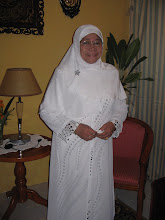Maal Hijrah to Muslims all over the world is inextricably intertwined with Awal Muharram.
The 29th day of December 2008 on the Gregorian calendar recently was Awal Muharram, the 1st day of the Islamic month of Muharram 1429.
The 29th day of December 2008 on the Gregorian calendar recently was Awal Muharram, the 1st day of the Islamic month of Muharram 1429.
Muharram is the first month in the Islamic calendar year which is based on the lunar cycle.
And the last month in the Islamic calendar is Zulhijjah, the month when Muslims undertake the pilgrimage to Makkah and when we find the festival and celebrations of Aidil Adha or Eid ul-Adha which marks the close of the pilgrimage.
BRIEF HISTORY
Awal Muharram, the start of the Muslim year, is based on the date of the Hijrah (or Hijra) meaning "migration", of Prophet Muhammad (sallallahhu alaihi wassalam) from Makkah to Medinah, in year 622 on the command and guidance of God, through His Angel Gabriel.
During the 13 years from the first revelation of Islam and its subsequent propagation, the Muslim community in Makkah had been subjected to severe tortures, enslavement, humiliations and persecution by the mostly anti-Muslims Quraish groups.
The Hijrah was in fact a great strategical move to a place where the populace wholeheartedly accepted Muhammad’s (s.a.w) prophet-hood and embraced Islam, and they were bent to defend and fight for the religion.
In fact, after several years, Prophet Muhammad (s.a.w) and his followers were able to return to Makkah where they forgave their enemies, and within a century of his death, Islam had spread to all parts of the world.
MAAL HIJRAH AND USHERING IN OF AWAL MUHARRAM (THE NEW YEAR)
In Islam, a new day starts in the evening upon sunset and not after midnight.
So, just before sunset on the last day of Zulhijjah, Muslims will read a special prayer (doa) after the evening Asar rites or prayers, to seek God’s forgiveness for sins committed during the year, and repentance for misdeeds.
And then after sunset ( it being a new year - Awal Muharram), Muslims will say another prayer (doa) immediately after Maghrib (dusk) rites or prayers, seeking God’s guidance and help towards a better spiritual and physical life in the new year.
Maal Hijrah is also a time to reflect and review the past year and make new resolutions for the year. It is a time to check personal progress and to find ways to make oneself a better person.
This is because the concept of Maal Hijrah in Islam, besides the physical migration, also means a migration or paradigm shift of the mind and attitude, a concept somewhat rejuvenated and made popular by Stephen Covey.
Islam had initiated a paradigm shift in the minds of the uncivilised and pagan-worshipping Arabs to the simplicity and logic of the Islamic faith. And when they understood Islam, they embraced the religion in droves.
History too has shown that the early Muslims rekindled a sense of positive culture and values in humankind which later led to the Renaissance of Europe and eventually led to the enhancement of man’s knowledge in all fields in the modern world.
In essence, Maal Hijrah demands a migration of the mind, body, soul and attitude from bad to good and from good to excellent, always improving and bettering oneself and society.
SPECIAL DAY IN THE MONTH OF MUHARRAM
Besides the Maal Hijrah celebration, the 10th day of Muharram is also a special day for Muslims.
On this day, many events were recorded in the history of the prophets of Islam, such as the birth of Prophet Adam (alaihi salam) and the birth and subsequent rise to heaven of Prophet Jesus (alaihi salam). To the Shiite Muslims, it is a day to remember the death of Prophet Muhammad’s grandson, Hussin (r.a) who was killed by the Muawiyahs.
On this special day, Muslims will cook a special porridge known as the Ashura Porridge ("Bubur Asyura" in Malay) for distribution mainly to the poor and needy.
This porridge is actually concocted and prepared from a mish-mash of ingredients and the outcome is a very delightful and tasty dish. It might taste unfamiliar to a first timer but it gets more delicious with more eating!
Besides rice, which is the main ingredient, other items that add special flavor to the porridge include meat, fish, chicken, vegetables and spices of all sorts, with the final outcome that looks reddish-yellow in color.
Bubur Asyura is normally cooked in big pots at the mosques and surau’s (mussollahs) in a joint community effort by the residents, and each household will get a helping of the porridge. The poor, orphans and vagrants are specially invited to come and they are given generous portions of this porridge, being a special day in Islam.
It is said that the recipe for this porridge was established during the time of Prophet Noah (alaihi salam) who made the porridge from the many ingredients available then, and gave it to those in need.
Also on this day pious Muslims will fast from dawn to sunset, it being one of the auspicious days in the month. Muslims on this day will also increase their spending for the family and give generous donations to the poor, and at the same time praying for God’s benevolence for their good deeds.
article from : http://www.pahang-delights.com/maal-hijrah.html


















![jefbuj@labuan [2009]](https://blogger.googleusercontent.com/img/b/R29vZ2xl/AVvXsEj4h_3rX8pnVo2cE_VXHl0nzAwVXfRld9GDwDIFxsuqdcw1dUVTBS-w-3Edv30tyY_VAd4RaTsLZ0FJoAoHaFRfd1rTYhjnZJsmqXt9GmRt8J6fTJHvtHdazPeZlBFIdAllZOXQRNVVZf0/s220/075.JPG)











.jpg)







No comments:
Post a Comment